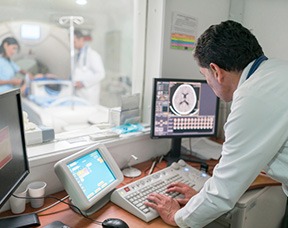A man with advanced prostate cancer has been reportedly cured of the disease after doctors from Johns Hopkins University School of Medicine in Baltimore “shocked” his tumors with large amounts of testosterone. The treatment also slowed the progression of the disease in the majority of the 46 other patients in the small, ongoing clinical trial. The early results are somewhat unexpected, since prostate cancer is thought to use testosterone as fuel, and most current treatments work by starving tumors of the hormone.
The test took 47 men through at least three cycles of exposing the cancer cells to extremely high doses of testosterone followed by a period of low levels of testosterone, which were caused by a drug that stopped the production of testosterone in their testicles. This treatment is currently known as bipolar androgen therapy (BAT).
“The results are unexpected and exciting. Our goal is to shock the cancer cells by exposing them rapidly to very high followed by very low levels of testosterone in the blood.”
-Professor Sam Denmeade Johns Hopkins University School of Medicine
For 28 days, participants in the clinical trial received a high dose of testosterone, while being given drugs to stop the testicles from naturally producing the hormone. Success was measured by monitoring the size of the men’s tumours, as well as levels of the Prostate Specific Antigen (PSA) that serves as a marker for prostate cancer. Researchers observed that 30% of the participants had about a 50% reduction in their PSA levels, while 40% of the men also experienced a dramatic decrease in their PSA levels.
In terms of side effects, one patient reported an increase in pain, and another had a problem with urine retention, but generally, the drug was well tolerated – although the sample size so far is too small to say for sure. Prof Denmeade said it was still not clear how the treatment worked, but it appeared to involve cell signalling and part of the process of cell division. Large doses of testosterone also seemed to cause prostate cancer cells to make breaks in their DNA.
“If we find testosterone is superior then we would hope to move on to larger trials. Our problem is this is not a drug that is owned by a pharmaceutical company; it is generic testosterone. So moving forward is going to be difficult due to issues with finding funds to run a bigger trial.”
-Professor Sam Denmeade Johns Hopkins University School of Medicine
Profesor Denmeade said the treatment was still very much in the experimental stages and not suitable for men with painful symptoms, because testosterone could worsen that pain. “Further studies are needed in order to understand exactly how intriguing developments like this work and to test the findings more robustly in large clinical trials.”


